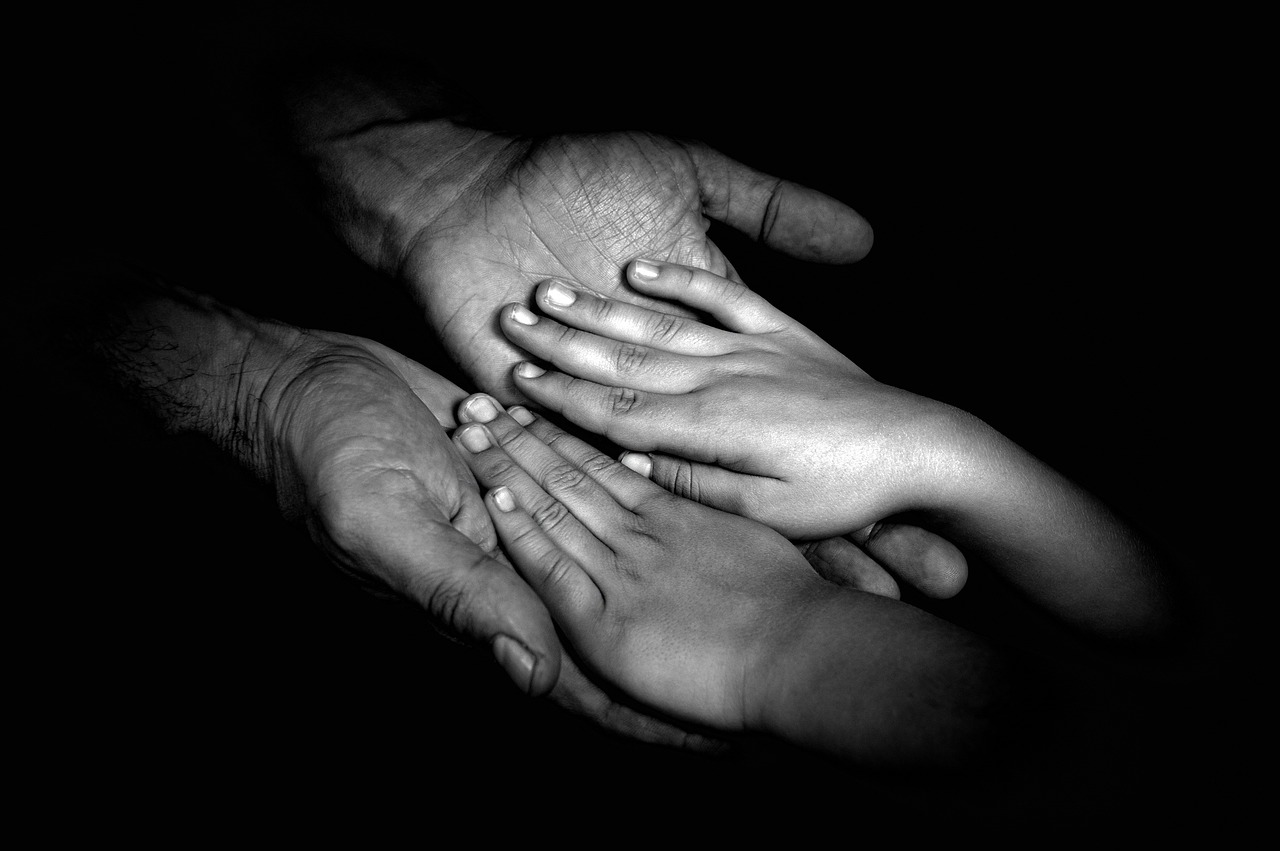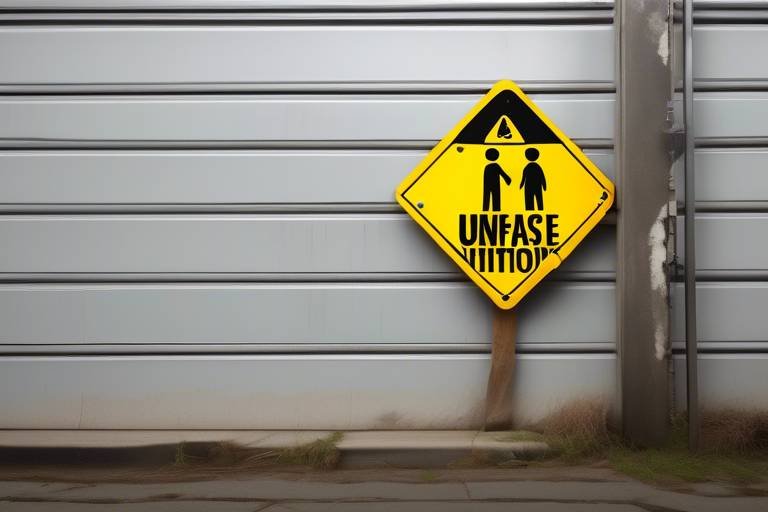Staying Safe in Emotionally Abusive Relationships
Emotionally abusive relationships can often feel like a maze, where every turn leads to confusion and distress. If you find yourself in a situation where your emotions are being manipulated, it’s crucial to recognize the signs and take proactive steps to protect yourself. In this article, we will explore the complexities of emotional abuse, offering insights on how to identify unhealthy dynamics, establish firm boundaries, and seek the necessary support to reclaim your life. Remember, you are not alone in this journey, and understanding is the first step toward healing.
Understanding the signs of emotional abuse is crucial for identifying unhealthy relationships. Emotional abuse often masquerades as love or care, making it hard to pinpoint. Common behaviors include:
- Manipulation: This can manifest as guilt-tripping or gaslighting, where your partner makes you doubt your own feelings and perceptions.
- Control: An abuser may try to control aspects of your life, from who you associate with to how you spend your time.
- Verbal Attacks: Insults and belittling comments can chip away at your self-esteem, leaving you feeling worthless.
- Isolation: An abuser may attempt to isolate you from friends and family, creating a sense of dependency.
Recognizing these signs can be the first step toward finding a way out of the emotional turmoil. It’s essential to trust your instincts; if something feels off, it probably is.
Setting boundaries is essential in any relationship, especially when it comes to protecting yourself from emotional harm. Healthy boundaries are like a fence around your emotional garden, keeping out negativity while allowing positivity to flourish. Here are some strategies to help you establish and maintain these boundaries:
- Communicate Clearly: Express your needs and limits openly. A partner who respects you will listen and adapt.
- Be Assertive: Stand firm in your boundaries. If someone crosses them, calmly reiterate your limits.
- Know Your Worth: Believe that you deserve to be treated with respect and kindness.
By establishing these boundaries, you create a safe space for healthy interactions, which is essential for emotional well-being.
Self-respect plays a vital role in emotional well-being. It acts as a shield against the toxicity of emotional abuse. When you value yourself, you send a message to others that you will not tolerate mistreatment. This self-empowerment is crucial in standing up against emotional manipulation. It’s like wearing armor that protects your heart and mind from harmful influences.
Self-care is an important aspect of healing from emotional abuse. It’s not just about bubble baths and pampering; it’s about nurturing your emotional health. Here are some practical self-care tips:
- Engage in Activities You Love: Whether it’s painting, hiking, or reading, do what makes your heart sing.
- Connect with Nature: Spending time outdoors can be incredibly grounding and restorative.
- Prioritize Rest: Ensure you get enough sleep to help your mind and body recover from stress.
These practices can help you regain your strength and confidence, making it easier to navigate the challenges of your situation.
Professional support can be invaluable for those in emotionally abusive relationships. Therapy and counseling offer a safe space to explore your feelings and develop coping strategies. A trained professional can help you untangle the web of emotional manipulation and provide tools to rebuild your self-esteem. If you’re unsure where to start, consider looking for therapists who specialize in emotional abuse or trauma recovery. They can guide you through the healing process.
Having a support system is crucial for those facing emotional abuse. Friends, family, and support groups can provide the emotional backing needed to escape abusive situations. It’s important to surround yourself with people who uplift you and validate your experiences. Here’s how to build your network:
- Reach Out: Don’t hesitate to talk to trusted friends or family about what you’re going through.
- Join Support Groups: Connecting with others who have similar experiences can be incredibly validating and comforting.
- Engage in Community Activities: Finding new social circles can introduce you to supportive and positive influences.
Remember, you don’t have to face this alone. A strong support network can be your lifeline.
Coping strategies can help individuals manage the emotional toll of abuse. These techniques can aid in navigating the challenges of emotionally abusive relationships. It’s like having a toolbox filled with resources that you can draw from when times get tough.
Mindfulness practices can enhance emotional regulation. Techniques such as meditation, deep breathing, and grounding exercises can help you remain centered, allowing you to respond thoughtfully rather than reactively in difficult situations. Think of mindfulness as a mental anchor that keeps you steady amidst the storm of emotions.
Journaling can serve as a powerful tool for reflection and self-discovery. Writing down your thoughts and feelings can help you process your experiences and gain clarity about your relationships. It’s like holding a mirror up to your emotions, revealing patterns and insights that might otherwise go unnoticed. Consider setting aside time each day to jot down your thoughts; it can be incredibly therapeutic.
Q: What are the first signs of emotional abuse?
A: Early signs include manipulation, control, and verbal attacks. Trust your instincts if something feels off.
Q: How can I set boundaries in my relationship?
A: Communicate your needs clearly, be assertive, and know your worth. Healthy boundaries are essential for emotional safety.
Q: When should I seek professional help?
A: If you feel overwhelmed or trapped in your situation, it’s a good time to seek therapy or counseling for support.

Recognizing the Signs of Emotional Abuse
Understanding the signs of emotional abuse is crucial for identifying unhealthy relationships. Emotional abuse can be subtle, often hiding behind a facade of love and concern. It might not leave physical marks, but its impact can be just as damaging, if not more so. Recognizing these signs is the first step towards reclaiming your power and establishing a healthier relationship with yourself and others.
One of the most prominent signs of emotional abuse is constant criticism. If you find that your partner frequently belittles you or makes negative comments about your appearance, intelligence, or abilities, this is a significant red flag. It’s as if they’re chipping away at your self-esteem, leaving you feeling inadequate and unworthy. Another common behavior is manipulation. This can manifest in various ways, such as guilt-tripping you into doing things you don’t want to do or twisting your words to make you feel responsible for their emotions.
Moreover, emotional abusers often employ tactics like gaslighting, where they deny your reality or make you question your own perceptions. They might say things like, “You’re just being too sensitive,” or “That never happened,” leaving you feeling confused and isolated. This kind of psychological manipulation can make you doubt your sanity, which is a powerful form of control.
Additionally, watch for signs of isolation. An abuser may attempt to cut you off from friends and family, claiming that they’re only looking out for your best interests. They might say things like, “Your friends don’t really care about you,” or “I’m the only one who truly understands you.” This tactic not only limits your support network but also makes you more dependent on them, which is exactly what they want.
Another behavior to be mindful of is emotional outbursts or unpredictable mood swings. If your partner's reactions seem disproportionate to the situation, it can create an atmosphere of fear and anxiety. You may find yourself walking on eggshells, always trying to avoid triggering their anger. This constant state of alertness is exhausting and can have lasting effects on your mental health.
Lastly, emotional abusers may use silent treatment as a form of punishment. By refusing to communicate, they create a sense of abandonment and confusion. You might feel like you’re constantly trying to earn their approval or affection, which can feel like an uphill battle. This cycle of emotional highs and lows can be incredibly draining, leaving you feeling emotionally depleted.
To summarize, recognizing the signs of emotional abuse is vital for anyone in a relationship. If you resonate with any of these behaviors, it’s important to take a step back and evaluate the dynamics of your relationship. Remember, you deserve to be treated with love, respect, and kindness. If these signs seem familiar, consider reaching out for support and taking the necessary steps to protect your emotional well-being.

Establishing Healthy Boundaries
Establishing healthy boundaries is not just a luxury; it’s a necessity in any relationship, especially when navigating the turbulent waters of emotional abuse. Think of boundaries as the invisible lines that protect your emotional and mental well-being. They define where you end and where someone else begins, creating a safe space for you to express your needs and desires without fear of manipulation or control. So, how do you go about setting these crucial boundaries?
First, it’s essential to understand what boundaries look like in practice. They can manifest in various forms, such as:
- Emotional Boundaries: Protecting your feelings and emotional state from being affected by others.
- Physical Boundaries: Defining your personal space and ensuring that it is respected.
- Time Boundaries: Allocating your time wisely and ensuring others respect your schedule.
- Material Boundaries: Protecting your belongings and financial resources.
Once you’ve identified the types of boundaries you want to establish, the next step is communication. It’s not enough to simply have boundaries in your mind; you need to express them clearly to others. This might feel daunting, especially if you’re used to people crossing your boundaries without consequence. However, remember that clarity is key. You might say something like, “I need some time to myself after work to unwind, so I won’t be available for calls during that time.” This direct approach not only sets the expectation but also reinforces your right to personal space.
But what if your boundaries are met with resistance? This is where the power of consistency comes into play. Just like a child learns the boundaries of their environment through repeated experiences, you too must be firm and consistent in enforcing your boundaries. If someone crosses a line, gently remind them of your needs. You might respond with, “I’ve mentioned that I need personal time, and I would appreciate it if you could respect that.” It might take time, but with consistency, others will begin to recognize and respect your boundaries.
Another critical aspect of establishing boundaries is self-reflection. Take time to understand why certain behaviors from others affect you deeply. Are there past experiences that make you more sensitive to specific actions? By understanding your triggers, you can communicate your boundaries more effectively. For instance, if you find that criticism makes you feel small, you can express, “I appreciate feedback, but I prefer it to be constructive and delivered in a kind manner.”
Lastly, remember that setting boundaries is not a one-time event; it’s an ongoing process. As relationships evolve, so too will your boundaries. Regularly check in with yourself to see if your boundaries still align with your needs. If you feel like they need to shift, don’t hesitate to adjust them accordingly. It’s all about creating a healthy space for yourself and ensuring that your relationships are built on mutual respect.
Q: What if my partner does not respect my boundaries?
A: If your partner consistently disrespects your boundaries, it may be a sign of emotional abuse. It’s essential to communicate your feelings and, if necessary, seek support from friends or professionals.
Q: How do I know if my boundaries are healthy?
A: Healthy boundaries promote mutual respect and understanding. If your boundaries make you feel safe and respected, they are likely healthy. If they cause conflict or resentment, it may be worth reevaluating them.
Q: Can I set boundaries in a friendship?
A: Absolutely! Boundaries are crucial in all types of relationships, including friendships. It’s important to communicate your needs clearly to maintain a healthy and supportive friendship.

The Importance of Self-Respect
Self-respect is the foundation upon which we build our emotional well-being. It’s that inner voice that tells you, “You deserve better.” Imagine self-respect as a sturdy shield, protecting you from the arrows of emotional abuse. When you value yourself, you become less susceptible to the manipulative tactics of others. But how do we cultivate this invaluable trait? It starts with recognizing our worth and understanding that we are not defined by someone else's perception of us.
In emotionally abusive relationships, the abuser often chips away at your self-esteem, making you feel unworthy and powerless. This is where self-respect becomes critical. It empowers you to set boundaries and stand firm against mistreatment. Think of it as a lighthouse guiding you through the stormy seas of emotional turmoil. When you respect yourself, you are more likely to advocate for your needs and refuse to accept behavior that diminishes your value.
Building self-respect isn’t a one-time event; it’s a continuous journey. Here are a few strategies to help you nurture self-respect:
- Practice Positive Self-Talk: Challenge negative thoughts about yourself. Instead of saying, “I can’t do anything right,” try, “I am capable and worthy of love.”
- Set Boundaries: Learn to say no. Establishing what you will and will not tolerate is a powerful way to reinforce your self-worth.
- Engage in Self-Care: Prioritize activities that make you feel good about yourself. Whether it’s a hobby, exercise, or simply taking time to relax, self-care is essential.
Moreover, self-respect fosters healthier relationships. When you value yourself, you attract others who share that respect. It creates a ripple effect, encouraging those around you to treat you with the same dignity you afford yourself. Remember, you teach others how to treat you by the way you treat yourself. If you allow disrespect, you’re signaling that it’s acceptable.
Ultimately, self-respect is not just about feeling good; it’s about **empowerment**. It’s about acknowledging your rights and standing up for them. When you cultivate self-respect, you’re not just surviving; you’re thriving. You become a beacon of strength, capable of navigating the complexities of relationships with confidence and grace. So, take a moment to reflect: Are you honoring your self-worth? If not, it’s time to start!
Q: What is self-respect?
A: Self-respect is the regard you have for your own well-being and happiness. It involves valuing yourself and your needs, and it is crucial for maintaining healthy relationships.
Q: How can I improve my self-respect?
A: You can improve your self-respect by practicing positive self-talk, setting boundaries, engaging in self-care, and surrounding yourself with supportive people.
Q: Why is self-respect important in relationships?
A: Self-respect is important because it helps you recognize your worth, set healthy boundaries, and attract relationships that are based on mutual respect.

Practicing Self-Care
Practicing self-care is not just a luxury; it’s a necessity, especially for those who have experienced emotional abuse. Imagine your emotional well-being as a garden; if you don’t tend to it, weeds of negativity and self-doubt can quickly overtake it. Self-care involves nurturing that garden, ensuring it flourishes with positivity, self-love, and resilience. It’s about taking proactive steps to recharge your emotional batteries and reclaim your sense of self.
One of the most effective self-care strategies is to establish a daily routine that prioritizes your mental and emotional health. This can include simple activities that bring you joy or relaxation. For instance, consider incorporating practices like:
- Mindfulness Meditation: Spend a few minutes each day focusing on your breath and letting go of negative thoughts.
- Physical Activity: Engage in exercises that you enjoy, whether it’s yoga, dancing, or a brisk walk in nature.
- Creative Outlets: Explore hobbies such as painting, writing, or playing an instrument to express yourself and process your emotions.
Additionally, it’s essential to set aside time for rest and relaxation. In our fast-paced lives, we often overlook the importance of simply unwinding. Whether it’s curling up with a good book, taking a warm bath, or enjoying a quiet evening with a favorite movie, these moments of respite can significantly rejuvenate your spirit.
Moreover, don’t underestimate the power of social connections. Surrounding yourself with supportive friends and family can provide a much-needed emotional boost. Reach out to those who uplift you, share your experiences, and allow them to remind you of your worth. Remember, you don’t have to go through this alone; community can be a powerful ally in your journey toward healing.
Lastly, consider keeping a self-care journal. Documenting your thoughts, feelings, and progress can serve as a therapeutic outlet. It allows you to reflect on your experiences, recognize patterns, and celebrate small victories along the way. Self-care is about progress, not perfection, and journaling can help you visualize that journey.
In summary, practicing self-care is an empowering act that can help you reclaim your strength and confidence after experiencing emotional manipulation. By prioritizing your mental health, engaging in enjoyable activities, nurturing relationships, and reflecting on your journey, you can create a robust foundation for healing and personal growth.
Q: What are some quick self-care activities I can do daily?
A: Quick activities include taking a short walk, practicing deep breathing exercises, enjoying a cup of tea, or spending a few minutes in nature.
Q: How can I find a support network?
A: Consider reaching out to friends, family members, or local support groups. Online communities can also provide a sense of connection and understanding.
Q: Is therapy necessary for healing from emotional abuse?
A: While therapy can be incredibly beneficial, it’s not the only path to healing. Self-care practices and supportive relationships can also play a significant role in recovery.

Seeking Professional Help
When you find yourself entangled in an emotionally abusive relationship, it can feel like you're wandering through a dense fog, unsure of which way to turn. Seeking professional help is not just a recommendation; it's a crucial step towards reclaiming your life and well-being. Therapists and counselors are equipped with the tools and knowledge to help you navigate the complexities of emotional abuse. They can provide a safe space for you to express your feelings, validate your experiences, and guide you towards healthier coping mechanisms.
One of the first things to consider when seeking professional help is finding the right therapist. Not every therapist will resonate with you, and that’s perfectly okay. It's essential to connect with someone who understands the nuances of emotional abuse and can offer tailored support. Here are some tips to help you in your search:
- Research Credentials: Look for professionals who specialize in trauma, emotional abuse, or relationship issues. Credentials can give you confidence in their abilities.
- Read Reviews: Online reviews or testimonials can provide insights into others' experiences with a therapist, helping you gauge their effectiveness.
- Schedule a Consultation: Many therapists offer a free initial consultation. Use this opportunity to see if you feel comfortable with them.
Once you find a professional you feel comfortable with, the journey of healing can begin. Therapy can help you unpack the layers of emotional turmoil you've experienced, empowering you to understand the patterns of abuse and how they have affected your self-esteem and relationships. It’s a space where you can learn to set boundaries, communicate your needs, and ultimately, regain control over your life.
Additionally, group therapy can be a powerful option. Connecting with others who have faced similar challenges can foster a sense of community and understanding. It reminds you that you are not alone in your struggles. Sharing experiences and coping strategies can be incredibly therapeutic and can help you develop a robust support network.
In conclusion, seeking professional help is a vital step in the healing process from emotional abuse. It’s about taking back your power and investing in your mental health. Remember, it’s okay to ask for help; it’s a sign of strength, not weakness. Every journey begins with a single step, and reaching out for support could be the most liberating step you take.
Here are some common questions individuals often have when considering professional help for emotional abuse:
- How do I know if I need therapy? If you feel overwhelmed by your emotions, struggle to cope with daily life, or find it hard to set boundaries, therapy can be beneficial.
- What should I expect in therapy? Expect a safe space to explore your feelings, learn coping strategies, and work towards healing at your own pace.
- How long does therapy take? The duration varies for everyone. Some may find relief in a few sessions, while others may require a longer commitment.

Building a Support Network
When you're navigating the stormy seas of an emotionally abusive relationship, having a solid support network can be your lifeboat. It's not just about having people around you; it's about surrounding yourself with those who truly understand your struggle and can provide the emotional backing you need to escape the toxic environment. Think of your support network as a safety net, catching you when you feel like you're about to fall. But how do you build this network? Let's dive in.
First and foremost, it's essential to reach out to trusted friends and family members. These are the people who know you best and can offer a listening ear or a shoulder to cry on. Sometimes, just sharing your feelings can lighten the emotional load you carry. However, it’s crucial to choose individuals who will be supportive rather than judgmental. You want those who can empathize with your situation and provide constructive advice.
Additionally, consider joining support groups, either in-person or online. These groups can be a treasure trove of understanding and shared experiences. They allow you to connect with others who have walked a similar path, providing a sense of community and belonging. Within these groups, you can share your story and hear others’ journeys, which can be incredibly validating. Here are some types of support groups you might find beneficial:
- Local community centers often host support groups for individuals facing emotional abuse.
- Online forums and social media groups can provide anonymity and a wider reach, allowing you to connect with people from various backgrounds.
- Therapy groups led by professionals can offer structured support and coping strategies.
Moreover, don't underestimate the power of professional help. Therapists and counselors are trained to guide you through the complexities of emotional abuse. They can provide you with tools to rebuild your self-esteem and help you develop healthier relationship patterns. Finding the right therapist is crucial, so take your time to research and choose someone who resonates with you.
Lastly, remember that building a support network is not a one-time event but an ongoing process. As you grow and heal, your needs may change, and so might your relationships. Stay open to forming new connections and nurturing existing ones. Surround yourself with positivity and encouragement, and you'll find that the journey to reclaiming your life becomes much more manageable. Building a support network is like planting a garden; it takes time, care, and patience, but the blooms of friendship and understanding will be worth it.
Q: How can I tell if someone in my support network is truly supportive?
A: Look for individuals who listen without judgment, offer constructive feedback, and respect your feelings. They should encourage you to seek help and empower you to make decisions that are best for your well-being.
Q: What if my family doesn't understand what I'm going through?
A: It can be tough when loved ones don't grasp the situation. In such cases, seeking out support groups or professional help can provide the understanding you need. Sometimes, those who have experienced similar situations can offer insights that family members may not.
Q: Can I build a support network online?
A: Absolutely! Online support groups and forums can be incredibly effective. Just ensure they are well-moderated and focus on creating a safe space for sharing experiences.
Q: How do I maintain my support network?
A: Regular communication is key. Check in with your friends and family, participate in group meetings, and be open about your feelings. Nurturing these relationships will help them grow stronger over time.

Developing Coping Strategies
When you're navigating the tumultuous waters of an emotionally abusive relationship, developing effective coping strategies is not just beneficial—it's essential. It's like learning to swim in a turbulent ocean; without the right techniques, you might find yourself overwhelmed by the waves of negativity and manipulation. Coping strategies can provide you with the tools needed to manage the emotional toll of abuse and help you regain a sense of control over your life.
One of the first steps in developing these strategies is to acknowledge your feelings. It’s completely normal to feel a whirlwind of emotions, from confusion to anger, and even guilt. Recognizing that these feelings are valid is crucial. It’s like standing in front of a mirror and finally seeing your reflection clearly after years of distortion. You can’t change what you don’t acknowledge, right?
Another powerful coping strategy is mindfulness. This practice involves being present in the moment and observing your thoughts and feelings without judgment. Mindfulness can serve as a grounding technique, allowing you to step back from the chaos of emotional abuse and regain clarity. Imagine being on a rollercoaster; mindfulness is like finding a way to pause the ride and take a breath, helping you to regain your composure before the next drop. Techniques such as deep breathing, meditation, or simply taking a walk in nature can enhance your ability to remain centered.
In addition to mindfulness, journaling can be a transformative tool for self-reflection. Writing down your thoughts and feelings can provide a safe space for you to process your experiences. It’s akin to having a heart-to-heart conversation with yourself, where you can express your innermost thoughts without fear of judgment. Journaling can help you identify patterns in your relationship, recognize triggers, and articulate your feelings, giving you the clarity needed to make informed decisions about your future.
Moreover, it’s essential to create a self-care routine. Self-care isn’t just a buzzword; it’s a fundamental practice that can help you heal and regain your strength. This could involve engaging in activities that bring you joy, whether it's reading a book, painting, or simply enjoying a warm bath. Think of self-care as the fuel for your emotional engine; without it, you might find yourself running on empty. Prioritizing your well-being sends a powerful message to yourself that you are worthy of love and respect.
Finally, consider developing a support network. Surrounding yourself with understanding friends and family can provide a buffer against the emotional turmoil of an abusive relationship. It’s like having a safety net; when you feel like you’re about to fall, those connections can catch you and help you find your footing again. Whether it’s through regular check-ins, shared activities, or simply having someone to talk to, a support system can make a significant difference in your emotional resilience.
In summary, developing coping strategies is a vital part of reclaiming your life from the clutches of emotional abuse. By practicing mindfulness, journaling, engaging in self-care, and building a support network, you can equip yourself with the tools needed to navigate the challenges ahead. Remember, you are not alone in this journey, and with the right strategies, you can emerge stronger and more empowered than ever.
- What are the signs of emotional abuse? Emotional abuse can manifest in various ways, including manipulation, gaslighting, constant criticism, and isolation from friends and family.
- How can I start setting boundaries? Begin by identifying what behaviors are unacceptable to you and communicate those clearly to your partner. It's essential to be firm and consistent in enforcing these boundaries.
- Is professional help necessary? While not always necessary, professional help can provide invaluable support and guidance, especially if you find it challenging to cope on your own.
- How can I build a support network? Reach out to friends, family, or support groups who understand your situation. Sharing your experiences can help you feel less isolated.

Mindfulness and Emotional Regulation
Mindfulness is not just a buzzword; it’s a powerful practice that can transform how we respond to emotional turmoil, especially when caught in the web of an emotionally abusive relationship. Think of mindfulness as a mental gym where you train your brain to focus on the present moment, helping you to observe your thoughts and feelings without judgment. When you’re in a situation filled with emotional manipulation, it can feel like being in a whirlwind—everything is chaotic, and it’s hard to find your footing. But mindfulness acts like an anchor, allowing you to regain your stability.
By practicing mindfulness, you can enhance your emotional regulation. This means you learn to respond thoughtfully rather than react impulsively. For instance, when faced with an emotionally charged situation, instead of lashing out or withdrawing, mindfulness encourages you to pause, breathe, and assess your feelings. This practice can be likened to a pause button on a remote control; it gives you a moment to collect your thoughts and choose a response that aligns with your values and needs.
To help you get started with mindfulness, here are some simple techniques you can incorporate into your daily routine:
- Breathing Exercises: Take a few moments each day to focus on your breath. Inhale deeply through your nose, hold for a few seconds, and exhale slowly through your mouth. This can help ground you and reduce anxiety.
- Body Scan Meditation: This involves lying down comfortably and mentally scanning your body from head to toe, noticing any tension or discomfort. It’s a great way to connect with your physical self and release stress.
- Mindful Observation: Spend a few minutes observing your surroundings. Focus on the colors, sounds, and textures around you. This practice can shift your attention away from negative thoughts.
Incorporating these techniques into your life can create a buffer against the emotional chaos of an abusive relationship. Moreover, regular mindfulness practice can help you build resilience, which is essential when navigating the complexities of emotional abuse. As you become more aware of your emotional triggers, you can respond to them with greater clarity and calmness.
Additionally, mindfulness can foster self-compassion. When you’re in an emotionally abusive relationship, it’s easy to fall into a cycle of self-blame and negativity. Mindfulness encourages you to treat yourself with kindness. Instead of criticizing yourself for feeling a certain way, you learn to accept your emotions as valid. This shift in perspective can be incredibly liberating and can help you break free from the cycle of emotional abuse.
In summary, mindfulness is a crucial tool for emotional regulation. It empowers you to take control of your emotional responses, fostering a sense of peace amidst the storm of emotional manipulation. By practicing mindfulness regularly, you not only enhance your emotional well-being but also pave the way for healthier interactions and relationships in the future.
Q1: How long does it take to see benefits from mindfulness practice?
A1: The benefits of mindfulness can vary from person to person, but many individuals report feeling more centered and less reactive within a few weeks of consistent practice.
Q2: Can mindfulness help with anxiety and stress?
A2: Absolutely! Mindfulness has been shown to reduce anxiety and stress by promoting relaxation and helping individuals to manage their emotional responses more effectively.
Q3: Do I need to meditate for long periods to benefit from mindfulness?
A3: No, even short sessions of mindfulness practice, such as 5-10 minutes a day, can be effective. The key is consistency and being present during those moments.

Journaling as a Tool for Reflection
Journaling can be an incredibly powerful tool for those navigating the tumultuous waters of emotionally abusive relationships. It acts as a personal sanctuary where you can express your thoughts and feelings without fear of judgment. Imagine it as a safe space where you can unload the emotional baggage that may have been weighing you down. When you put pen to paper, you not only document your experiences but also create an opportunity for self-reflection and growth.
One of the most significant benefits of journaling is that it allows you to process your emotions. When you write about your experiences, you can explore the complexities of your feelings, whether they be anger, sadness, confusion, or even guilt. This process can help you identify patterns in your relationship that may have gone unnoticed. For instance, you might start to recognize recurring themes of manipulation or control that you had previously brushed aside. By acknowledging these patterns, you empower yourself to take action.
Additionally, journaling can serve as a means of clarifying your thoughts. Sometimes, our minds can feel like a chaotic jumble of emotions and ideas. Writing things down helps to untangle that mess, allowing you to see your situation more clearly. You might find that by articulating your thoughts, you can make sense of what you truly want and need from your relationships. This clarity can be liberating and is often the first step toward establishing healthier boundaries.
Moreover, journaling can help you track your progress over time. By regularly documenting your feelings and experiences, you can look back and see how far you’ve come. This can be particularly encouraging during tough times when you might feel stuck or defeated. You can create a simple table in your journal to track your moods or significant events, which can provide insight into your emotional journey:
| Date | Emotion | Event | Reflection |
|---|---|---|---|
| 01/01/2023 | Sadness | Argument with partner | Felt unheard and dismissed |
| 01/08/2023 | Empowerment | Set a boundary | Felt proud of standing up for myself |
Incorporating journaling into your self-care routine can also enhance your emotional resilience. By regularly reflecting on your experiences, you can develop a deeper understanding of your emotional triggers and how to manage them. This practice can help you cultivate a sense of self-awareness that is crucial for breaking free from the cycle of emotional abuse. You might even find that journaling helps you identify supportive friends or resources that can aid you in your healing journey.
So, how do you get started with journaling? It doesn't have to be complicated! Here are a few tips to help you make the most of this reflective practice:
- Choose a medium: Whether it's a traditional notebook, a digital app, or even voice memos, select a format that feels comfortable for you.
- Set a regular time: Try to carve out a few minutes each day or week dedicated to journaling. Consistency is key!
- Be honest: Write freely without worrying about grammar or structure. This is your personal space, so let your thoughts flow.
- Review periodically: Take time to read back through your entries. You may notice patterns or insights that can guide your healing process.
In conclusion, journaling is more than just writing; it’s a pathway to self-discovery and healing. By engaging in this practice, you can gain valuable insights into your emotional landscape, helping you navigate the complexities of your relationships with greater clarity and confidence.
1. How often should I journal?
There's no set rule! Some people find daily journaling beneficial, while others prefer to write a few times a week. The key is to find a rhythm that works for you.
2. What should I write about?
You can write about anything that’s on your mind—your feelings, daily events, reflections on your relationships, or even your goals and dreams.
3. Is journaling effective for everyone?
While journaling can be a helpful tool for many, it’s important to find what works best for you. If journaling doesn’t resonate, consider other forms of self-expression, like art or talking to a friend.
4. Can journaling help me feel better?
Many people find that journaling helps them process their emotions and gain clarity, which can lead to feeling more empowered and in control of their lives.
Frequently Asked Questions
- What are the common signs of emotional abuse?
Emotional abuse can be subtle and often hard to recognize. Common signs include constant criticism, manipulation, gaslighting, and controlling behaviors. If you feel like you're walking on eggshells around someone, that could be a red flag.
- How can I establish healthy boundaries in my relationship?
Establishing healthy boundaries starts with clear communication. Be open about what behaviors are acceptable and what aren't. Remember, it's okay to say no and prioritize your well-being. Boundaries help maintain respect and understanding in any relationship.
- Why is self-respect important in overcoming emotional abuse?
Self-respect is your foundation for standing up against emotional abuse. When you value yourself, you're more likely to recognize when someone is crossing the line. It empowers you to take action and seek healthier interactions.
- What are some self-care practices I can implement?
Self-care can take many forms! Consider activities like meditation, exercise, or simply taking time to enjoy a hobby. Journaling can also be a great way to process your feelings and reflect on your experiences.
- How can professional help assist me in an emotionally abusive relationship?
Therapists can provide a safe space to explore your feelings and develop coping strategies. They can guide you through the healing process and help you build the confidence to make empowering choices in your life.
- Why is a support network crucial when dealing with emotional abuse?
A support network offers emotional backing and practical help when you're facing challenges. Friends, family, or support groups can provide perspective and encouragement, making it easier to navigate difficult situations and decisions.
- What coping strategies can help me manage the emotional toll of abuse?
Mindfulness practices, such as deep breathing or meditation, can help you stay grounded. Journaling is another effective tool for reflection. These strategies allow you to process your emotions and respond thoughtfully instead of reactively.
- How does mindfulness improve emotional regulation?
Mindfulness helps you become more aware of your thoughts and feelings, allowing you to respond to situations with intention rather than impulse. This awareness can lead to better emotional regulation and healthier interactions.



















